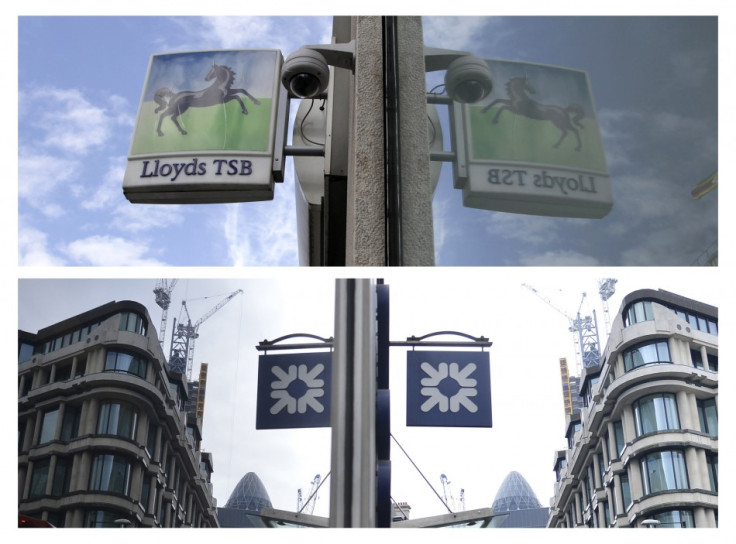Lloyds and RBS: UK's good bank, bad bank scenario

In the UK, investment banking has become so non grata that we now think in terms of a good bank and a bad bank comprising these once-bloated, risk taking giants.
It's interesting that lately all of Lloyds could be thought of as a good bank, while the bigger offender RBS looks kind of bad.
Nowadays the unglamorous world of retail banking has become the acceptable business model for UK banks. Customer service has been the mantra repeated by the likes of RBS boss Ross McEwan, as if it were a compound interest payment to be returned to the taxpayer until the end of time.
But all that good stuff has costs attached to it too, a fact mostly overlooked amid the serious business of ring fencing anything remotely risky.
Mark Taylor, Dean of Warwick Business School and Professor of Finance, told IBTimes UK: "The universal style of bank seems to be on the way out, especially in the UK. Here we have this issue about ring-fencing.
"People have become used to free banking. But it's not really free. It is paid for by risk incurred by the other side of the bank. Now we must return to vanilla style banking with more bank charges – charges are going up," he said.
It's unclear who in the investment banking arena will benefit from the UK's anorexia towards it. Banks like RBS served a lot of clients, employed many skilled bankers and held squillions in corporate assets – much of it the bad part that's being wound down and sold off.
Deutsche Bank for example, has been predicted to become a dominant global investment bank, powered as it is by Germany's Mittlestand industry, where there's still a need for M&A advisory services and investment advice around the world.
In any case, the contrast between Lloyds and the RBS is sharper now than ever. Lloyds is earning back millions. Meanwhile, the Tories, fresh from winning the election, said they expect to take a bath on RBS.
Lloyds' shares are up over 80p; 73.6p is the break-even point of the bailout. Over half the original 40% stake taken on by the government has now been sold down recouping some £10bn, and it looks likely to make a profit on the remainder.
RBS on the other hand remains 80% owned by the taxpayer. Its breakeven price is 482p, but it's currently trading below 354p. If Osborne accelerates plans to offload RBS the resulting loss could be as much as £13bn.
Taylor added: "I would not be surprised if the government sells off RBS quite quickly. I expect the rest of Lloyds will go by the end of this year and RBS probably as well."
In a statement on May 14, Lloyds said its full return to private hands by the end of the year is "possible and would be very desirable". The Treasury's remaining 20% stake will apparently be gone within 12 months, said Lloyds.
But clement market conditions alone are not going to solve the deep-seated problems at RBS. A wildly overreaching purchase of Dutch bank ABN Amro in late 2007 left it with no capital to protect it when the banking collapse happened the following year. RBS won the ignominious claim to have reported the largest financial loss in UK corporate history - £24bn.
Lloyds was also in trouble of course, particularly through its HBOS arm, and carried some £47bn of bad loans at the time of the crash. However, Lloyds chief executive António Horta-Osório has found it easier to reduce the bank's reliance on money markets.
We must remember Lloyds' investment banking operations were much smaller than RBS's. And of late, Lloyds, which is the UK's largest mortgage lender, has benefited from robust growth in the property market.
The former chief of RBS, Stephen Hester has come under criticism for not getting out of investment banking fast enough.
Then there's the fines: RBS seems to have incurred more than its fair share of fines linked to things like Libor – again this is probably down to the sheer size of its investment and trading operations, as opposed to being particularly "bad".
Hester must have faced his darkest hour when plans for Santander to buy RBS - known internally as "Project Rainbow" - fell apart in October 2012. This was just more evidence that it is hard to shift an entire culture. It involves lots of restructuring, which takes time.
As far as the numbers go, RBS's ongoing restructuring involves eye-watering sums of money. Although Hester has done a large amount of the heavy financial engineering, McEwan is faced with exiting from some £166bn of assets. RBS's US branches division, Citizens Bank, accounts for £72bn, while RBS's loss-making Corporate and Institutional Bank division (CIB) is worth £56bn.
There's also the float of branches under the William and Glyn brand scheduled for 2016. Just carrying this out will cost £1.5bn.
One off charges, property write downs, redundancies, accounting for businesses sold under par, fines and PPI provisions probably make up the rest.
"RBS losses are mainly write-offs, fines, and one off charges. Were it not for those they would have been in the black already," noted Taylor. "Don't forget there's a lot of profitability in banking."
© Copyright IBTimes 2024. All rights reserved.






